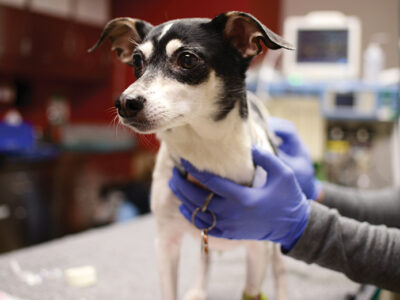The family
of Jesse Gelsinger, the
18-year-old who died at Penn’s Medical Center last fall while participating
in a much-scrutinized gene-therapy study, is suing the University for
wrongful death, assault, battery, lack of informed consent and fraud.
The legal action, filed on September 18, contends that researchers played
down the risks of participating in the study to the patient; failed to
consult regulatory boards before changing experiment protocol; and failed
to disclose a lead scientist’s “conflict of interest,”
which included ties to a firm which helped fund the Penn lab where the
study was based. According to the suit, Gelsinger died “as a direct
result of the carelessness, negligence, recklessness, and wanton and willful
conduct of the defendants.” The plaintiffs are asking for damages
in excess of $50,000 from each defendant named in each of eight counts
in the complaint.
Gelsinger suffered
from a hereditary liver disorder known as ornithine transcarbamylase deficiency
(OTCD), which prevents the liver from properly processing ammonia. He
died on September 17, 1999, four days after he was injected with a modified
cold virus that was designed to carry corrective genes to his liver.
In addition to
the University as a whole, the lawsuit names the three principal scientists
of the study: Dr. James M. Wilson, the John Herr Musser Professor and
Chair of Cellular and Molecular Engineering who is director of the Institute
for Human Gene Therapy, which oversaw the experiment; Dr. Mark Batshaw
C’67 of the Children’s National Medical Center in Washington,
D.C.; and Dr. Steven Raper, associate professor of surgery at Penn. The
suit also names former University of Pennsylvania Health System CEO Dr.
William Kelley, who recruited Wilson; Dr. Arthur Caplan, director of Penn’s
Center for Bioethics and Trustee Professor of Bioethics in Molecular and
Cellular Engineering; Genovo, a genetic- research firm founded by Wilson
which provided much of the lab’s funding; the Children’s Hospital
of Philadelphia; and the Children’s National Medical Center.
While noting
that “our deepest sympathy is with the Gelsinger family,” that
Penn “remains committed to improving its oversight and monitoring
of human subject research,” and that “substantial resources
of time, energy and money have already been devoted to that task,”
the University stated that the complaint, “by its very nature, tells
only one version of a very complicated and painful story.”
Though the University
has acknowledged “weaknesses” in the IHGT’s monitoring
and oversight of clinical trials, it argued that they did not contribute
to Gelsinger’s death. In addition, it asserted, Gelsinger was fully
warned of the risks of participating in the study, and the University
“categorically rejects” the idea that financial gain played
any part in the clinical trial.
After investigating
the OTCD study, the U.S. Food and Drug Administration ordered a halt to
all clinical trials at the IHGT back in March. The University announced
in May that, among other changes, the IHGT would no longer conduct human
trials, limiting its experimentation to cellular, molecular and animal
models. That announcement was followed a month later by a warning letter
from the FDA faulting the animal experiments used to justify human research
at the lab [“Gazetteer,” July/August].
Wilson, incidentally,
has resigned from one relatively minor post, that of head of medical genetics
in the Department of Medicine, though he is still director of the IHGT
and chair of the Department of Molecular and Cellular Engineering.
In its statement,
the University said it hopes to “concentrate on moving forward with
its aggressive efforts to provide a national model for human subject research,”
adding:
“In the end, establishing and constantly improving that model will
be the best way to mark subsequent anniversaries of this tragic death.”
UPDATE: SETTLEMENT ANNOUNCED NOVEMBER 3, 2000
Gelsinger Family and University Settle
Six weeks after filing a lawsuit against the University and other parties over the death of 18-year-old Jesse Gelsinger (above), the Gelsinger family agreed to an out-of-court settlement for an undisclosed sum. The family had filed its suit on September 18 for wrongful death, assault, battery, lack of informed consent and fraud; the agreement to settle was announced November 3.
In a statement, the University said it “extends its deepest sympathy to the Gelsinger family,” and that it “appreciates the seriousness and openness with which the family and its representatives entered into the discussions that led to the settlement.” Saying that it hoped that the agreement “will enable the Gelsingers to bring a small measure of closure to their loss,” Penn noted that it can now “concentrate on moving forward with its aggressive efforts to improve its oversight and monitoring of human subject research,” an effort to which it has “already devoted substantial resources of time, energy and money.” The goal, it added, “is to establish—and to continually improve upon—a national model for clinical research, and in this way honor Jesse Gelsinger’s memory.”
The Gelsinger family noted that the purpose of their lawsuit was “always to bring to the public certain critical issues concerning human participation in clinical trials in general, and gene-therapy trials in particular.” Saying that while they “fervently hope gene therapy will one day be the means to cure many of the horrible diseases afflicting so many, they urge that the road toward this or any medical breakthrough is free of conflicts of interest, bioethical missteps and inadequate government insight.
“The Gelsingers appreciate that Penn, whatever its faults in the past, is taking seriously the need for research universities to improve the conditions under which clinical research is conducted,” they added. “Penn has said it is staking out a leadership position on these issues, and that meant a great deal in resolving this case.”
After the settlement was reached, Paul Gelsinger, Jesse’s father, told The Daily Pennsylvanian: “That we never got an apology does not help this wound to heal. If they don’t have the heart to even apologize, I don’t see how they can consider themselves a national leader in bioethics.
“I let Penn off the hook because there is a bigger problem [with oversight and ethics] that I expect to be addressed. To me, that’s what killed Jesse,” he added. “I’m all for these guys [the IHGT researchers], but first they have to lick their wounds and admit what they have done. I have never wanted anyone to lose their jobs—just to wake up.”
The University has acknowledged weaknesses in the IHGT’s monitoring and oversight of clinical trials, but maintains that those weaknesses did not contribute to Gelsinger’s death.




